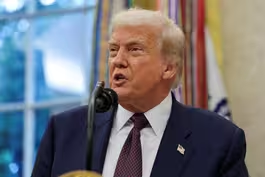
New book 'Joy Goddess' reveals A’Lelia Walker's influence
Clip: 8/7/2025 | 8m 37sVideo has Closed Captions
New book 'Joy Goddess' reveals how A’Lelia Walker helped shape the Harlem Renaissance
In "Joy Goddess," journalist and historian A’Lelia Bundles brings to life a fascinating and misunderstood figure of the early 20th century. A’Lelia Walker was more than a glamorous socialite. She was a cultural catalyst whose salons and soirées became the vibrant center of the Harlem Renaissance. Geoff Bennett spoke with Bundles, who is Walker’s great-great-granddaughter, about her new book.
Problems playing video? | Closed Captioning Feedback
Problems playing video? | Closed Captioning Feedback
Major corporate funding for the PBS News Hour is provided by BDO, BNSF, Consumer Cellular, American Cruise Lines, and Raymond James. Funding for the PBS NewsHour Weekend is provided by...

New book 'Joy Goddess' reveals A’Lelia Walker's influence
Clip: 8/7/2025 | 8m 37sVideo has Closed Captions
In "Joy Goddess," journalist and historian A’Lelia Bundles brings to life a fascinating and misunderstood figure of the early 20th century. A’Lelia Walker was more than a glamorous socialite. She was a cultural catalyst whose salons and soirées became the vibrant center of the Harlem Renaissance. Geoff Bennett spoke with Bundles, who is Walker’s great-great-granddaughter, about her new book.
Problems playing video? | Closed Captioning Feedback
How to Watch PBS News Hour
PBS News Hour is available to stream on pbs.org and the free PBS App, available on iPhone, Apple TV, Android TV, Android smartphones, Amazon Fire TV, Amazon Fire Tablet, Roku, Samsung Smart TV, and Vizio.
Providing Support for PBS.org
Learn Moreabout PBS online sponsorshipGEOFF BENNETT: In her new book, award-winning# journalist and historian A'Lelia Bundles## brings to life one of the most fascinating and# misunderstood figures of the early 20th century.
A'Lelia Walker, daughter of Madam C.J.# Walker and heiress to a beauty empire,## was more than a glamorous socialite.# She was a cultural catalyst whose## salons and soirees became the vibrant# center of the Harlem Renaissance.
Drawing on meticulous research and rare family# Archives, Bundles, who is Madam Walker's## great-great granddaughter, offers a vivid portrait# filled with music, arts, politics and joy.
I spoke with her about the book "Joy Goddess:# A'Lelia Walker and the Harlem Renaissance."
A'Lelia Bundles, welcome to the "News Hour."
A'LELIA BUNDLES, Author, "Joy Goddess: A'Lelia# Walker and the Harlem Renaissance": Delighted## to be with you, Geoff.
GEOFF BENNETT: It's great to have you here.
You have spent decades preserving the#.. Madam C.J.
Walker.
You have# written four books about her.## What made you shift your focus# to her daughter, A'Lelia Walker?
A'LELIA BUNDLES: You know, I really# wanted to write about A'Lelia Walker## first.
I wrote about her for a# report in high school in 1970.
And she fascinated me because she knew about# all of the Harlem Renaissance actors and## writers who I loved learning about.
But Madam# Walker's story really had to be told first.
GEOFF BENNETT: And it strikes me there# are scholars who have dismissed her as## a socialite who played bridge, who did# little more than spend the money that her## mother made.
What did you discover# about her as you did the research?
A'LELIA BUNDLES: Really, she had been caricatured.
And what I discovered was a really charismatic# woman, one of the original influencers,## I think a social impresario, who walked# into a room with all of her charisma,## and I think who had a gift for bringing people# together.
She could bring together her friends## from downtown, her friends from uptown,# her European friends, her African friends,## people who were in the arts,# people who were in business.
And there were very few people who both had that## circle of friends and who had# the personality to carry it off.
GEOFF BENNETT: Well, you write in the book# that she was the woman Harlem needed.
She## was stylish.
She was ambitious.# She was unapologetically herself.
How did her persona and public image influence how# many Black women saw themselves during that time?
A'LELIA BUNDLES: Well, people were# fascinated by Madam C.J.
Walker,## A'Lelia Walker's mother.
She represented success# in business, and her daughter was really the## first Black celebrity heiress, somebody# who could live her life fully and freely.
There were -- this was a time when African# Americans were really emerging into## urban areas.
It was two generations out of# slavery, when people were really still finding## their way.
But now there was an educated# middle-class group of professional African## Americans.
And she was the person who was# kind of at the center of the social scene.
GEOFF BENNETT: The center of it.
I mean, she# was a fixture of the Harlem Renaissance.
She## was a patron of the arts, as you say.
You# describe her salons and her parties as these## vibrant spaces of cross-racial exchange.# Why was she so intentional about that?
A'LELIA BUNDLES: I think we take# for granted now that we can have## gatherings, social gatherings, that are very# racially integrated, that are international.
She welcomed her queer and straight friends# equally.
And I think that this is the kind of## thing.
She was one of the people who made this# comfortable.
She wanted everybody to be there.## And now we think that's not something that's# unusual, but it was really quite unusual then.
GEOFF BENNETT: Tell me about the grand townhouse# she had on -- it was West 136th Street, the Dark## Tower.
And you have some archival materials that# sort of illustrate how incredible that space was.
A'LELIA BUNDLES: Exactly.
needed to have a business presence.# Their business was headquartered in## Indianapolis.
But New York was# the media capital of the world.## It was becoming the Black cultural and# political mecca for African Americans.
And she said, we need to be there.
And# so she persuaded her mother to buy a## townhouse.
It became a double townhouse# with a beautiful facade.
And, in 1927,## A'Lelia Walker converted a floor of that# townhouse into what became known as the## Dark Tower.
It was a cultural salon,# where the musicians and writers and## artists and actors mingled with patrons# and mingled with other social people.
So I actually have the original invitation# from the Dark Tower.
A'Lelia Walker had## invited people to come to the Dark Tower.
She# and the mother of the artist Romare Bearden,## Bessye Bearden, and A'Lelia Walker met in# the spring of 1927 with Langston Hughes,## Wallie Thurman, Countee Cullen, Richard Nugent.
GEOFF BENNETT: Wow.
A'LELIA BUNDLES:.. what is it that you would like?
How can we# help promote the work of these young writers?
And they came up with this# idea for the Dark Tower,## named it after Countee Cullen's poem "From# the Dark Tower."
And in October of 1927,## hundreds of people lined up outside to come# to this place.
And this says -- it was,## "We dedicate this tower to the aesthetes," to# the young writers and artists and musicians.
And it was really quite unusual for# them to be able to have this space,## in addition to the invitation, which shows# a picture of a bookcase that was designed## like a tower, like a skyscraper.
I also have# the original menu, "A Feast for the Muses."
And one of my favorite things is A'Lelia Walker# Iced Tea.
Now, this was prohibition.
So I don't## know what went in the iced tea, but I do know that# A'Lelia Walker had a flask, a monogrammed flask.
GEOFF BENNETT: And that's her flask.
A'LELIA BUNDLES:.. flasks.
And so we can just imagine what# went into that A'Lelia Walker Iced Tea.
GEOFF BENNETT: How did her role# as a convener and a patron help## shape the cultural and political# course of the Harlem Renaissance?
A'LELIA BUNDLES: People saw A'Lelia# Walker as kind of the personification## of Black business success and of an# heiress, that she was the one who had## the great party.
She was the one who# people kind of fantasized about being.
And because she had such a gregarious, open# personality, she wasn't a snob with that money.## She was a person who welcomed people in.
And that# meant all of the people who were creating culture,## who were creating music, and the people who loved# to have a good time wanted to be in her sphere.
One society columnist said that people flocked# to her like bees flocked to honey.
And another## one said that, when she was having a party,# she would get on the phone and she would say,## darling, I'm having a party tonight.
And it# wouldn't be the same without you.
Absolutely not.
And then people wanted to be in her party# so much, the plus one became the plus two,## the plus three, the plus four.
So# they were always really crowded.
GEOFF BENNETT: And yet there's this recurring# tension in this book between who she really was## and how she was perceived.
How did she navigate# the expectations that were placed upon her?
A'LELIA BUNDLES: Yes, well, the title Joy# Goddess comes from Langston Hughes' memoir,## "The Big Sea," where he called# her the Joy Goddess of Harlem's## 1920s because of her personality# and because of her great parties.
But there is an irony in that Joy Goddess, because# while she was the one who created joy for a lot## of people, there were also moments in her own# life with a lot of heartache and with a lot of## disappointment.
People always compared her to# her mother.
Of course, she could not live up to## this larger-than-life icon, this business# entrepreneur that Madam C.J.
Walker was.
So she was trying to carve out her# own identity.
And A'Lelia Walker was## trying to both blend the work that she# was supposed to do as president of the## Madam C.J.
Walker Manufacturing Company# after her mother's death with her own## desire to be a patron of the arts, to advance# culture and to celebrate the young creatives.
GEOFF BENNETT: The book is "Joy# Goddess: A'Lelia Walker and the## Harlem Renaissance," its author, A'Lelia Bundles.
It's so good to see you.
A'LELIA BUNDLES: Always good# to see you, full circle.
As tariffs kick in, economist flags recession warning signs
Video has Closed Captions
Clip: 8/7/2025 | 5m 44s | As Trump's tariffs kick in, economist breaks down inflation and recession warning signs (5m 44s)
A Brief But Spectacular take on intergenerational community
Video has Closed Captions
Clip: 8/7/2025 | 4m 3s | A Brief But Spectacular take on the power of intergenerational communities (4m 3s)
GOP Rep. Lawler calls for redistricting battles to end
Video has Closed Captions
Clip: 8/7/2025 | 5m 55s | 'Mutually assured destruction': GOP Rep. Lawler calls for redistricting battles to end (5m 55s)
A look at Trump's legal power as he threatens DC takeover
Video has Closed Captions
Clip: 8/7/2025 | 6m 3s | A look at Trump's legal authority over DC as he threatens federal takeover (6m 3s)
Medicaid reliance places Louisiana on frontlines of cuts
Video has Closed Captions
Clip: 8/7/2025 | 5m 23s | Louisiana’s high Medicaid reliance places state on frontlines of health care cuts (5m 23s)
Mideast experts analyze risks as Israel considers occupation
Video has Closed Captions
Clip: 8/7/2025 | 9m 46s | Mideast experts analyze consequences as Israel considers full Gaza occupation (9m 46s)
News Wrap: Netanyahu aims to reoccupy all of Gaza militarily
Video has Closed Captions
Clip: 8/7/2025 | 7m | News Wrap: Netanyahu says Israel aims to reoccupy all of Gaza militarily (7m)
Providing Support for PBS.org
Learn Moreabout PBS online sponsorshipSupport for PBS provided by:
Major corporate funding for the PBS News Hour is provided by BDO, BNSF, Consumer Cellular, American Cruise Lines, and Raymond James. Funding for the PBS NewsHour Weekend is provided by...


















